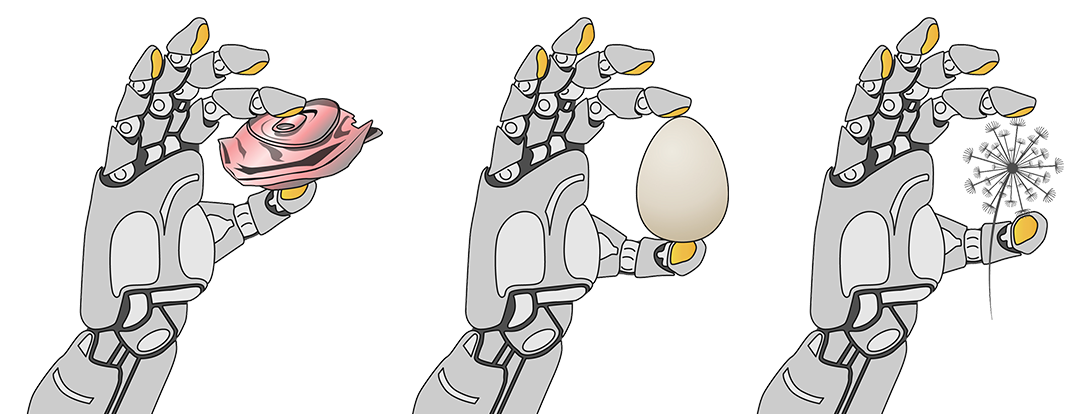Demonstratoren

Wie lassen sich die Ergebnisse der verschiedenen Forschungsbereiche innerhalb von livMatS in funktionale Materialsysteme und zu prototypischen Produkten zusammenführen? Wie werden diese Materialsysteme aussehen und sich anfühlen? Sind ihre industrielle Produktion und spätere Anwendungen überhaupt realisierbar? Zur Beantwortung dieser Fragen entwirft und baut livMatS technologische Demonstratoren, die als erste Schritte zur späteren Nutzung der neuen Materialsysteme in industriellen Produkten dienen und deren breites Anwendungsspektrum aufzeigen.
livMatS entwickelt dabei drei Linien von Demonstratoren: Zwei sind Machbarkeitsstudien, während die dritte auf praktische Anwendungen abzielt. Ein Demonstrator ist von den Schnappmechanismen der Venusfliegenfalle und der Wasserradpflanze inspiriert und soll alle Funktionen der lebenden Vorbilder besitzen. Zu den anderen Demonstratoren gehören weiche autonome Maschinen mit eingebauten Sensorik-, Wahrnehmungs-, Steuerungs- und Entscheidungsfunktionen. Zu den praktischen Anwendungsbereichen können formangepasste Objekte für die Nutzung in spezifischen Arbeitsumgebungen oder medizinische Zwecke gehören.
Koordinator
Prof. Dr. Thomas Speck
Projekte
Langzeitprojekte 2022 und 2023
- Biological and bioinspired autonomous hygroscopic materials systems
- Logic gated soft autonomous machine walker with soft switches and sensors for environmental interaction
- livMatS Artificial Venus Flytrap Systemic Demonstrator
- Soft autonomous machine systems driven by hydrogen peroxide based gas pressure generation with logic gated fuel/gas distribution system (H2O2LogicGatesSaM)
Kooperationsprojekt der Forschungsbereiche B und Demonstratoren. - SNAPVALVE - Soft snap-through electromechanical valves for autonomous soft machines
Kooperationsprojekt der Forschungsbereiche C und Demonstratoren. - METAINFLATE – Inflatable Metamaterials for Morphological Control
Kooperationsprojekt der Forschungsbereiche C und Demonstratoren. - The non-local meta-material of the pomelo peel for bio-inspired long-fiber reinforcement
Kooperationsprojekt der Forschungsbereiche B und Demonstratoren. Dieses Projekt ist Teil des Agnes-Pockels Doctoral Fellowship Program des Exzellenzclusters.
Langzeitprojekte 2019 und 2020
- Demonstratoren für weiche, autonome Maschinen – softrobotische, energiesparende Greifersysteme mit sensorischen Fähigkeiten auf Basis von livMatS-Materialien
Kooperationsprojekt der Forschungsbereiche B, D und Demonstratoren. - NANOTRET: Nanomikrostrukturierte, permanent geladene Oberflächen für Elektret-Nanogeneratoren
Kooperationsprojekt der Forschungsbereiche A und Demonstratoren. - Entwicklung, Charakterisierung und Integration von flexiblen Solarmodulen als Energieversorgungseinheiten in einem livMatS-Demonstrator
Kooperationsprojekt der Forschungsbereiche A und Demonstratoren. - Biological and bioinspired (meta-) materials – New 3D/4D-printers for Demonstrator development
In Kollaboration mit den Forschungsbereichen B und C. Dieses Projekt ist Teil des Hermann Staudinger Doctoral Fellowship Program des Exzellenzclusters. - Development of an artificial Venus flytrap
In Kollaboration mit den Forschungsbereichen A, B und C.
Booster-Projekte 2023 - abgeschlossen
- Biomechanics of Venus flytrap stomach formation and trap reopening
Principal Investigator: Prof. Dr. Thomas Speck
Responsible Investigator: PD Dr. Simon Poppinga - Controlled oxygen release through force
Kooperationsprojekt der Forschungsbereiche B und Demonstratoren.
Principal Investigators: PD Dr. Michael Walter und Prof. Dr. Henning Jessen - Plant-inspired humidity-driven bending actuator
Kooperationsprojekt der Forschungsbereiche B, C und Demonstratoren.
Responsible Investigator: Prof. Dr. Claas Müller
Principal Investigators: Dr. Olga Speck und Prof. Dr. Thomas Speck - Biomechanics of liana tendrils and searcher twigs as models for novel plant-inspired soft root arms
Kooperationsprojekt der Forschungsbereiche B und Demonstratoren.
Principal Investigator: Prof. Dr. Thomas Speck - 3D Printing of shape-morphing surfaces for mechanical metamaterial surfaces
Kooperationsprojekt der Forschungsbereiche B, C und Demonstratoren.
Principal Investigator: Prof. Dr. Bastian E. Rapp
Junior Research Group leader: Dr. Viacheslav Slesarenko - Maskless microstructuring of livMatS surfaces
Kooperationsprojekt der Forschungsbereiche B, C und Demonstratoren.
Principal Investigators: Prof. Dr. Jürgen Rühe und Prof. Dr. Bastian E. Rapp - Thin-walled structures for soft machines via a new soap-bubbleinspired manufacturing technique
Kooperationsprojekt der Forschungsbereiche B, C und Demonstratoren.
Principal Investigator: Prof. Dr. Chris Eberl - Emergent self-organization in macroscopic systems with stimuli-responsive elements
Kooperationsprojekt der Forschungsbereiche A, B und Demonstratoren.
Junior Research Group leader: Dr. Viacheslav Slesarenko
Principal Investigator: Prof. Dr. Lars Pastewka - ECPhotoACT - First steps towards photoelectrochemical actuators
Kooperationsprojekt der Forschungsbereiche A, B und Demonstratoren.
Principal Investigator: Prof. Dr. Anna Fischer
Booster-Projekte 2021 - abgeschlossen
- A Soft Biomimetic Actuator Inspired by the Self-Sealing Motion of Succulent Plants
Kooperationsprojekt der Forschungsbereiche C und Demonstratoren
Principal investigators: Prof. Dr. Thomas Speck und Dr. Olga Speck
Responsible Investigator: Prof. Dr. Claas Müller - Highly flexible triboelectric strain sensors
Kooperationsprojekt der Forschungsbereiche A und Demonstratoren
Principal Investigator: Prof. Dr. Peter Woias - Novel Materials Systems for Applications in Biomimetic Architecture and Building Construction
Kooperationsprojekt der Forschungsbereiche B, C und Demonstratoren.
Principal Investigators: Prof. Dr. Thomas Speck und Prof. Dr. Jürgen Rühe
Kurzprojekte 2021 - abgeschlossen
- Unit Cell artificial Flytrap Gripper
Principal Investigator: Prof. Dr. Thomas Speck - Biomimetic Speaking Valve
Principal Investigator: Prof. Dr. Thomas Speck - Characterization and evaluation of 3D printing techniques for rapid prototyping of pneumatic biomimetic soft robotic gripper fingers
Principal Investigator: Prof. Dr. Thomas Speck
Kurzprojekte 2020 - abgeschlossen
- Fiber Compound Connection
Kooperationsprojekt der Forschungsbereiche B, D und Demonstratoren.
Principal Investigator: Prof. Dr. Thomas Speck - Lightweight Materials Systems
Kooperationsprojekt der Forschungsbereiche B und Demonstratoren.
Principal Investigator: Prof. Dr. Thomas Speck